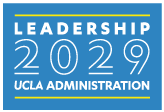Management Topic: UC Experience Conversations
Dear Colleagues,
As we wrap up 2022, many of us find ourselves reflecting on the last year: what went well, what we would like to focus on in the new year, and how we can be a positive force for change. As managers and supervisors, your leadership has a significant and direct impact on your staff’s experience working at UCLA. Open dialogue surrounding this experience provides honest feedback and allows you to make immediate, impactful changes more easily than when gathered through other avenues, such as feedback captured through the UC climate survey.
These two-way conversations with your current employees, also known as "stay interviews," are a way for you to build constructive relationships, trust, and discuss areas that are important to employees. These informal conversations help you understand what makes UCLA and your department a great place to work, and also can have a positive impact on issues within your control. While these are not formal performance review conversations, they may result in action items, follow-up, and leader support related to job satisfaction, career development, or motivation at work.
Earlier this year, the UC Experience Conversations Toolkit was announced. This toolkit was developed by a UC systemwide workgroup to support career development and increase retention of valued employees. The tools are intended to enhance one-on-one, broad-ranging conversations between managers and staff and cover topics such as overall job experience, retention, well-being and work-life balance, career development, inclusion and belonging, and manager support.
It’s recommended that supervisors hold these conversations at least once a year and more frequently if possible. In scheduling these meetings, management should be mindful of timing them effectively and taking any personal factors into account. Remember to utilize active listening and ask follow-up questions as appropriate. Stay open to feedback: asking these questions and expecting honest responses requires that you be prepared to hear what your employee has to say. Responding defensively will dissuade your employee from further honesty and will likely be communicated to others, preventing this process from working effectively. At the end of the discussion, express your gratitude to the team member for their time and candid feedback. You should then work together with your employee to identify and agree to an action plan with responsibilities and timelines. Action planning questions are included in the link below.
The toolkit can be found on the UC Experience Conversations website and includes a list of questions, an overview presentation, and draft employee communication.
Additional questions you can ask include:
- What do you look forward to when you come to work each day?
- What talents are not being used in your current role?
- What would you like to learn more about?
- What motivates (or demotivates) you?
Additional courses and tools to learn more about this topic are noted below:
- Stay Interviews (article)
- Positive Atmosphere: Establishing a Positive Work Environment (25-minute e-course)
- Why the ‘stay interview’ is the next big trend of the Great Resignation (article)
It’s important to be mindful that now that you’ve solicited your employee’s feedback, your employee will expect you to act on feedback within your control. You must also be accountable for helping to create the positive work culture you tell your employees you hope to maintain.
The MMT thanks you for your continued readership. Stay tuned for more topics in the new year!

Interested in reviewing prior months’ topics? Visit our Monthly Management Tips website.
Do you have feedback, questions or a suggested topic you would like to learn more about? Please email: managementtips@ucla.edu.
Want to receive Monthly Management Tips emails? Sign up for our list!

